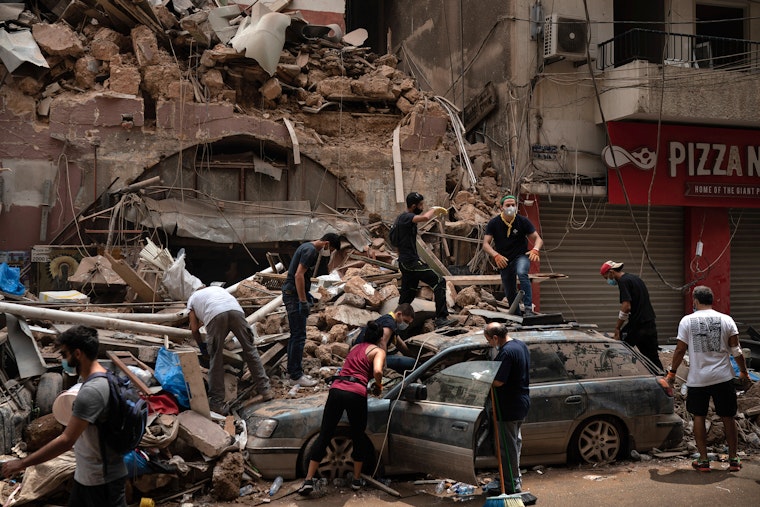Justice for Victims of the Beirut Blast
By Zena Wakim

It began like any other mundane summer evening. Sarah Copland was watching her two-year-old toddler eating dinner at their home in Beirut, Lebanon, when suddenly, disaster struck. An apocalyptic explosion ripped through the port city. The blast threw Sarah to the ground. Glass debris hit her son Isaac’s heart. His parents rushed his petite body outside, desperately searching for medical assistance. There was none to be found; all major hospitals in town had been destroyed in the blast. The little boy’s heart stopped beating.
Isaac was just one of the casualties of the deadly August 4, 2020, explosion, caused by the detonation of 2,750 tons of military-grade ammonium nitrate stored without adequate safety measures. During the days that followed the detonation, the luckier ones cared for their injuries while hundreds of others buried their dead in what has widely been described as one of the largest non-nuclear explosions in history.
As death tolls rose, there was an outpouring of international sympathy for Lebanon and numerous calls for accountability. But as it always happens, human rights considerations were soon replaced with more pressing matters: geopolitics and financial interests.
Two years ago, as I sat in my office in Geneva watching the nightmare unfold before our eyes, it became impossible for me to remain passive. I took up the cause of Isaac’s family and others, representing victims of the port blast.

It has now been two years since the explosion. No justice has been dispensed. In fact, Lebanon, which was already suffering from its 15-year civil war, is today more devastated than it has ever been. Following the war, people still had hope. Today, hope has become a luxury most cannot afford, as their lives are reduced to the logistics of survival.
In Lebanon, justice remains essentially an abstract concept.
The well-intentioned Judge Tarek Bitar, in charge of the investigation, is the target of relentless attacks from corrupt politicians he dared summon or charge in the case; he faces numerous recusal requests filed by the corrupt political elite. Members of parliament implicated in the blast claimed immunity from prosecution, ensuring they would continue to win re-election.
A Human Rights Watch investigation last year concluded that these politicians were informed of the presence of the ammonium nitrate. They not only failed to take necessary steps to protect the public, but when confronted with evidence of having been warned of the dangers, denied responsibility and sought to shift blame elsewhere, the report found. “Under international human rights law, a state’s failure to act to prevent foreseeable risks to life violates the right to life,” the report states.
I was not hit by the explosion. My family and I fled Lebanon when I was 10 during the civil war to settle in Switzerland. And yet my attachment to my homeland remains strong. I have spent many years since advocating for the voiceless around the globe, but never lost the place in my heart for my country. I felt a duty to help the blast victims in Lebanon—seeking reparations for clients in a court of law in Texas, while also working on a broader accountability initiative in Lebanon and elsewhere.
On July 11, 2022, nine American nationals and green card holders filed a claim against the U.S.-Norwegian company TGS in Harris County, Texas, where TGS operates its business. The firm owns Spectrum Geo (UK), a company it had merged with in 2019, which had inked several contracts with Lebanon’s Ministry of Energy and Water.
The latter chartered a ship to Lebanon—the Rhosus, a derelict vessel owned by a Russian businessman, sailing under a Moldovan flag and carrying 2,750 tons of military-grade ammonium nitrate, which has been commonly used in the war raging next door in Syria.
The plaintiffs, advised by Ford O'Brien LLP, an American law firm, say it was neither coincidence nor happenstance. Spectrum knew that it had entered into these contracts with a highly corrupt, highly dysfunctional state.
The lawsuit against TGS is an important step toward attaining justice for the Lebanese people. The plaintiffs and Accountability Now—the Swiss foundation which assisted the victims in their quest for accountability—want the individuals responsible for setting the stage that led to the Beirut blast held liable.
Through the investigations, we will be able to unveil the wider network of corruption which led to the blast. (TGS denies the allegations and plans to contest them in court.)
But more must be done. European countries must stop turning a blind eye to the corruption of Lebanon’s politicians and cease actively sheltering ill-gotten assets in their banks. Western governments, upon which the Lebanese government depends for revenue and aid, should use their leverage to help pursue justice, including through targeted individual sanctions against those obstructing the investigations. The United Nations Human Rights Council must also set up an international investigation into the port blast.
I refuse to accept a system that allows hundreds of billions generated through corruption to be pumped out of the Lebanese economy to the benefit of the unscrupulous political elite, and to the detriment of the population. I refuse to stand by while corrupt politicians enjoy impunity for endangering the safety of weaker members of society.
The world can choose to look away or to act. I chose the latter. For Isaac, and all the victims of Beirut’s deadly blast.
Accountability Now is a grantee of the Open Society Foundations.
Zena Wakim is an international lawyer and president of the board of Accountability Now.
